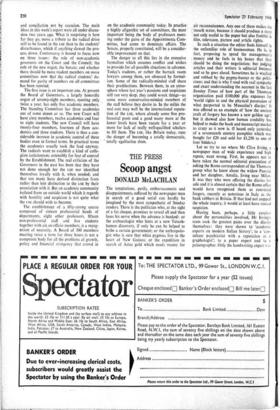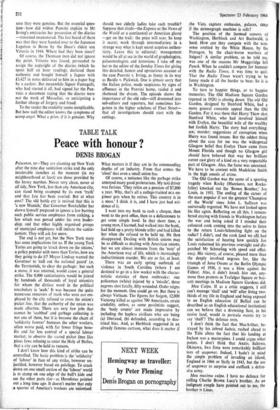Scoop angst
THE PRESS DONALD McLACHLAN
The temptations, perils, embarrassments and disappointments suffered by the newspaper man in search of a good serial can hardly be imagined by the most sympathetic of Sunday readers. There is the politician who, at the sight of a fat cheque, promises to reveal all and then loses his nerve when the advance is banked: or the archaeologist who hints at a new Tutank- hamen discovery, if only he can be helped to bribe a certain government; or the anthropolo- gist who is sure that white pygmies live in the heart of New Guinea; or the expedition in search of Aztec gold which needs money for
air reconnaissance. Any one of these makes the mouth water, because it should produce a story not only useful to the paper but also fruitful in film, television, picture and article rights.
In such a situation the editor finds himself in the unfamiliar role of businessman. He is, in fact, proposing to spend the management's money and he feels in his bones that they should be doing the negotiation; but judging articles and their writers is editorial business and so he goes ahead. Sometimes he is waylaid and robbed by the pygmy-hunter or the politi- cians; and that is why I read with real sympathy and exact understanding the account in the last Sunday Times of how part of the Thomson organisation paid £100,000 plus expenses for `world rights to and the physical possession of what purported to be Mussolini's diaries.' It was offered as an example of 'how the ancient craft of forgery has known a new golden age'; but it showed also how human credulity has helped to make the book and manuscript market as crazy as it now is. (I heard only yesterday of a seventeenth century pamphlet which was bought for £20 and sold for £1,250 to one of four bidders.) Let us try to see where Mr Clive Irving, a newspaper man of wide experience and high repute, went wrong. First, he appears not to have taken the normal editorial precaution of asking the Rome correspondent of the Thomson group what he knew about the widow Panvini and her daughter, Amalia, living near Milan. It was they who were offering the diaries for sale and it is almost certain that the Rome office would have recognised them as convicted forgers, recently as notorious in Italy as the bank robbers in Britain. If that had not stopped the whole inquiry, it would at least have roused suspicion.
Having been, perhaps, a little careless about the personalities involved, Mr Irving's team took the greatest pains over the diaries themselves: they were shown to 'academic experts on modern Italian history'; to a 'con- sultant psychiatrist with a reputation as a graphologist'; to a paper expert and to a palaeographer. Only the handwriting expert v% as sure they were genuine. But the essential ques- tion—how did widow Panvini explain to Mr Irving's emissaries her possession of the diaries —remained unanswered. The last heard of them was that they were handed over to the Japanese Legation in Berne by the Duce's eldest son Vittorio in 1944. Where had they been since?
Of course, the Thomson men did not ignore the point. Vittorio was found, persuaded to assign the copyright of. the .diaries (which he spent half an hour reading), declared them authentic and bought himself a Jaguar with £3,427 in notes delivered to him in a paper bag by a cashier. But meanwhile Signor Fumagalli, who had started it all, had signed for the Pan- vinis a document saying that the diaries were not the work of Mussolini, so anticipating a further charge of forgery and fraud.
To the reader the credulity seems inexplicable. But how well the editor knows the symptoms of scoop angst. What a prize, if it is genuine. Why should two elderly ladies take such trouble? Suppose that rivals—the Express or the News of the World or a continental or American glossy —get on the trail : the price will soar. So keep it secret; work through intermediaries; in a strange way what is kept secret acquires authen- ticity. Leave this to editorial: management would be all at sea in the world of graphologists, palaeontologists and historians. I take off my hat to the editor of the Sunday Times for giving this detailed, honest and uproarious account of the case Panvini v. Irving, as funny in its way as Bardle v. Pickwick. One is almost sorry that the Italian police, made suspicious by signs of affluence in the Panvini home, raided it and shattered the dream. The episode shows the importance of the old rule—still drummed into sub-editors and reporters, but sometimes for- gotten in the higher echelons of Fleet Street— that all investigations should start with the cuttings.



































 Previous page
Previous page